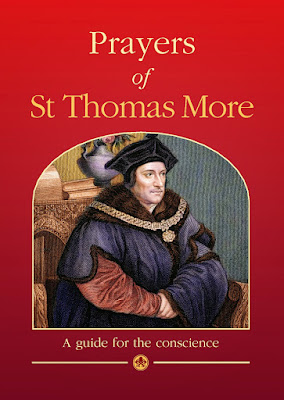We're going to begin with the prayer itself after our general introduction last week to More's circumstances and plan for his life and death in the Tower of London. Now we'll begin to see how applicable his plan is to our Lenten practices of fasting, almsgiving and prayer. Here are the lines for this conversation:
To set the world at naught.To set my mind fast upon thee and not to hang
Upon the blast of men’s mouths.
To be content to be solitary,
Not to long for worldly company.
Little and little utterly to cast off the world
And rid my mind of all the business thereof.
Give my thy Grace, good Lord; More begins in the right place, asking God's grace to accomplish his plan of life. I think that's where we should begin too. "Oh God, come to my assistance. Make haste to help me." We can't do this on our own, saving ourselves, manifesting our own willpower to achieve these ends. Whatever we set out to do or not to do, we have to discern that it's what is best for us to do, with God's grace, and then ask for His grace to help us persevere with our Lenten discipline so it transforms us by the end of the season, prepared for the Holy Triduum and Easter Sunday!
His first petitions introduce the negative and positive aspects of his preparation, and ours:
To set my mind fast upon thee and not to hang
Upon the blast of men’s mouths.
Upon the blast of men’s mouths.
First to treat the world as nothing of importance; to become detached from the world. How do we do this?
Like Thomas More, husband, father, and friend, diplomat and author, former Speaker of the House of Commons, Lord Chancellor, if we're active laity, we have to be involved in the world in many ways, in our families, workplaces, our cities, states, and country. We can't abandon it.
I think he offers two ways to face this challenge:
First, setting our minds fast upon the Lord, through prayer, spiritual reading, silence, and all the different ways Catholic tradition has given us. That's part of any Christian life, intensified during Lent.
Second, to avoid the "blast of men's mouths", the cacophony of talk and endless speculative debate. Perhaps not reading or listening to all the "talking heads" on television and radio discussing politics or sports to no consequence? When I heard some sports talk still discussing the Super Bowl two weeks after the event, debating who lost the game for the 49ers, I thought, how useless! They've got to fill the hours, but I don't have to listen or watch.
In the following lines, perhaps the first part ("To be content to be solitary,/Not to long for worldly company.") applies most directly to More's situation in the Tower of London, but the last part can apply to us as we try to "Little and little utterly to cast off the world/And rid [our minds] of all the business thereof", especially when it's not really our business . . .
I'm sure Matt or Anna will have other responses and suggestions . . .
Saint Thomas More, pray for us!

No comments:
Post a Comment